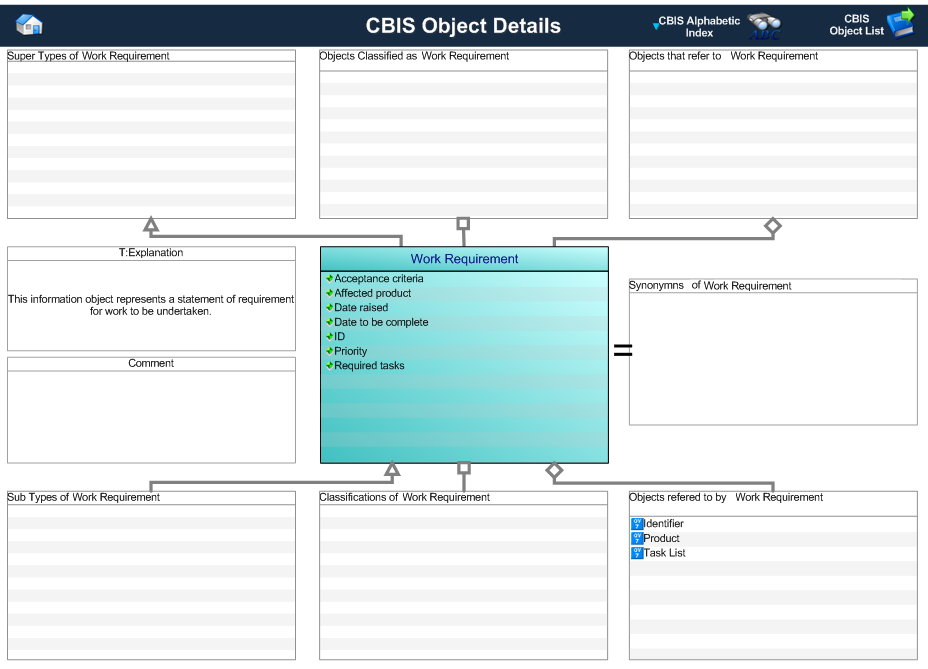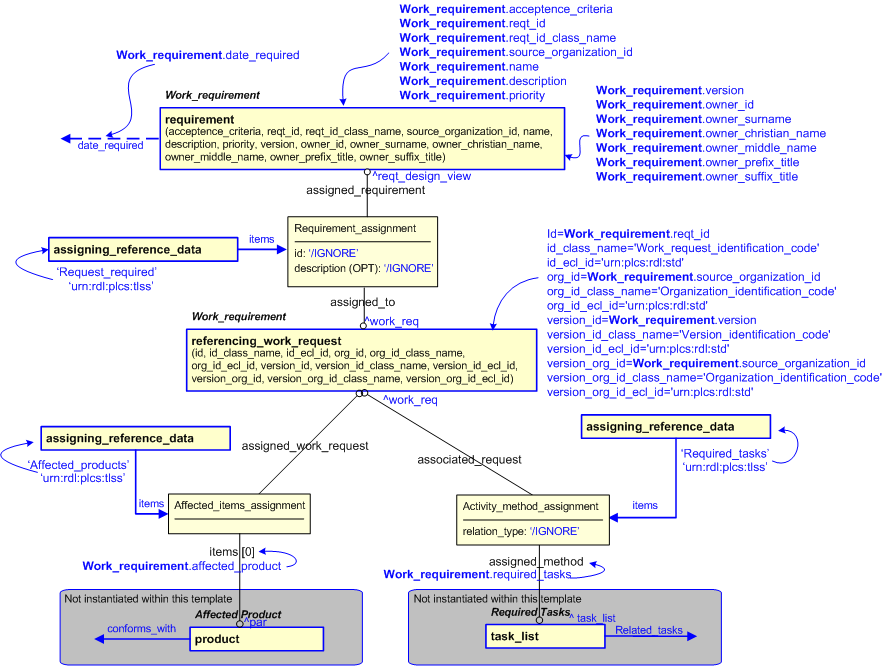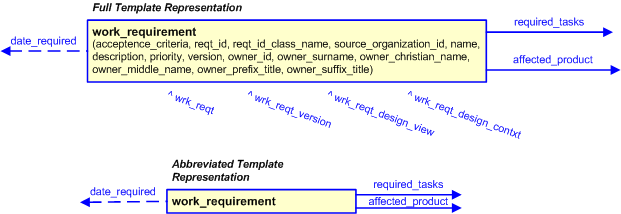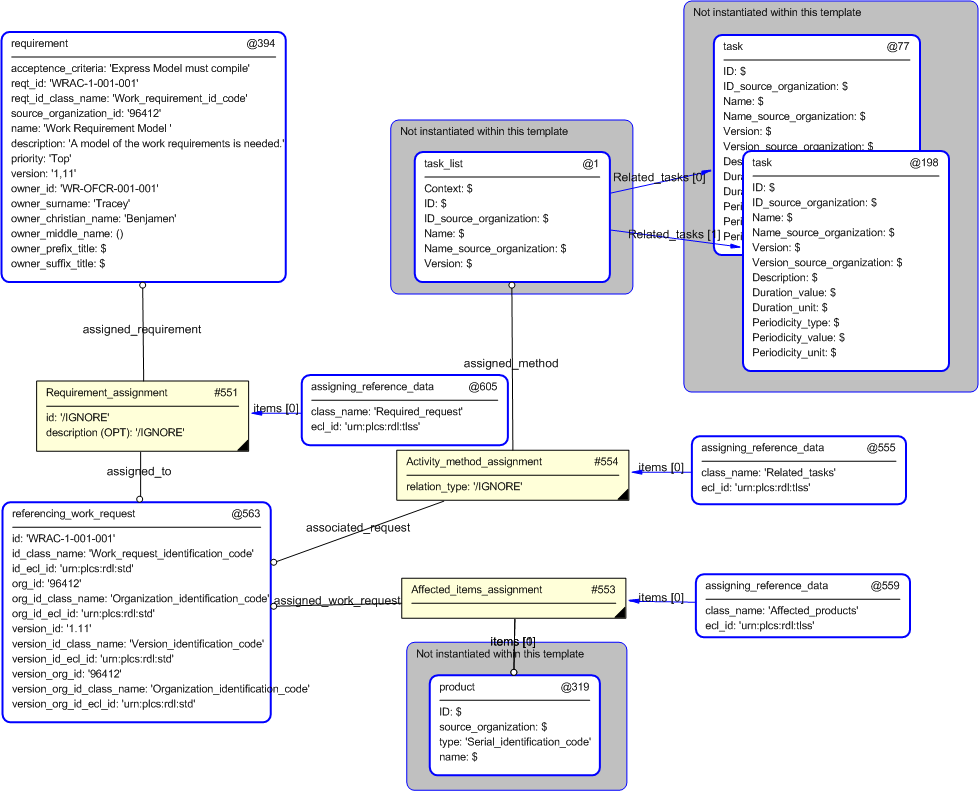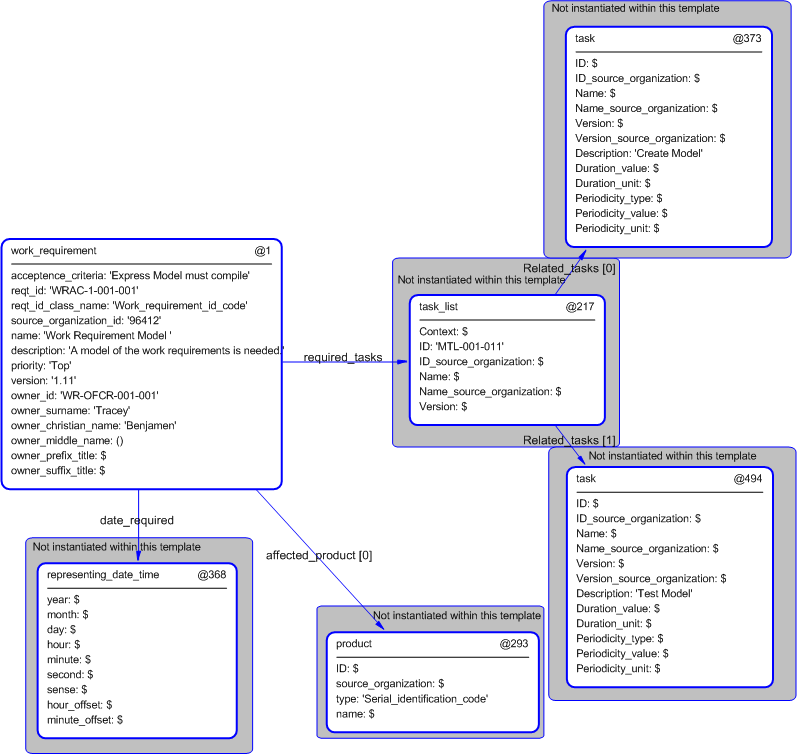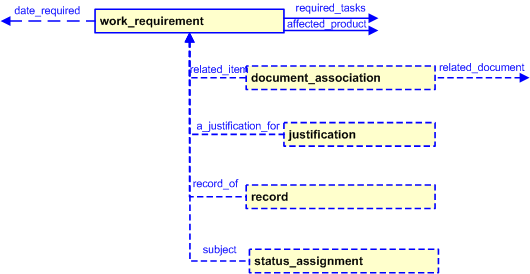Template:— work_requirement (wrk_reqt)
Context:— UK_Defence |
Date: 2009/10/28 17:51:03
Revision: 1.4
|
This section specifies the template work_requirement.
NOTE
The template has been defined in the context of
UK_Defence.
Refer to the business context for details of related templates.
NOTE
An explanation of a template and the associated instantiation path is
provided in the
Template overview
section.
This template describes how to represent the information requirements of a UK_Defence Work Requirement object. A Work Requirement
object represents a statement of requirement for work to be undertaken.
A Work Requirement information object is a type of Requirement that provides a set of tasks that may be used to provide a
solution (i.e. remedy) to a specified issue (e.g. a symptom/issue) associated with a particular Product (the affected Product).
The tasks identified may or may not be the same as those that are actually carried out, but should identify the solution(s)
(or methods) used to bring the Product back into an agreed level of serviceability.
The EXPRESS-G diagram in
Figure
2
shows the templates and EXPRESS entities that are required
to represent the template
"work_requirement".
The text highlighted in blue shows the template parameters.
This figure shows a relationship between a Requirement and a Work_request, via a Requirement_assignment. This allows the other
relations from the Work_request to both the affected products and required tasks to be referenced. The id, source organization
and version information is the identical across both the Requirement and the Work_request.
Figure 2 — An EXPRESS-G representation of the Information model for work_requirement
The graphic for the template to be used in other EXPRESS-G diagrams
is shown in Figure
3
below.
This figure shows the additional relationships that are added by the Work_requirement business object.
Figure 3 — The graphical representation of the work_requirement template
The following input parameters are defined for this template:
The date that the requirements are to be met.
The identifier assigned to a requirement.
The requirement's description
The priority level of the Requirement
The identifier assigned to a requirement version.
The owner of the requirement.
The following reference parameters are defined for this template:
Allow the
Requirement
entity instantiated in this path to be referenced when this template is used.
Note: The
Requirement
entity can be referenced in a template path by:
%^target = $work_requirement.wrk_reqt%
where
target
is the parameter to which the
Requirement
is bound.
Allow the
Requirement_version
entity instantiated in this path to be referenced when this template is used.
%^target = $work_requirement.wrk_reqt_version%
%^target = $work_requirement.wrk_reqt_design_view%
%^target = $work_requirement.wrk_reqt_design_contxt%
The instantiation path shown below specifies the entities that are to be
instantiated by the template.
A description of templates and the syntax for the instantiation path is
provided in the
Templates Help/Information section.
/
requirement(
acceptance_criteria=@acceptance_criteria,
date_required=@date_required,
reqt_id=@reqt_id,
source_organization_id=@source_organization_id,
name=@name,
description=@description,
priority=@priority,
version=@version,
owner=@owner)/
-- re-direct the output from the call.. %^wrk_reqt = $requirement.reqt%
%^wrk_reqt_version = $requirement.reqt_version%
%^wrk_reqt_design_view = $requirement.reqt_design_view%
%^wrk_reqt_design_contxt = $requirement.reqt_design_contxt%
-- To remove - handled by supertype -- Date_or_date_time_assignment -- Date_or_date_time_assignment.role='/IGNORE' -- Date_or_date_time_assignment.items -> ^wrk_reqt_version -- Date_or_date_time_assignment.assigned_date -> @date_required %^ra =
Requirement_assignment%
Requirement_assignment.assigned_requirement ->
^wrk_reqt_design_view
Requirement_assignment.id = '/IGNORE'
Requirement_assignment.description = '/IGNORE'
-- provide the role of the Requirement_assignment by classifying it /
assigning_reference_data(
items=^ra,
class_name='Request_required',
ecl_id='urn:plcs:rdl:uk_defence')/
/
referencing_work_request(
id=@reqt_id,
id_class_name='Work_request_identification_code',
id_ecl_id='urn:plcs:rdl:std',
org_id=@source_organization_id,
org_id_class_name='Organization_identification_code',
org_id_ecl_id='urn:plcs:rdl:std',
version_id=@version,
version_id_class_name='Version_identification_code',
version_id_ecl_id='urn:plcs:rdl:std',
version_org_id=@source_organization_id,
version_org_id_class_name='Organization_identification_code',
version_org_id_ecl_id='urn:plcs:rdl:std')/
-- recast the call for the work request %^wrk_request = $referencing_work_request.work_req%
Requirement_assignment.assigned_requirement ->
^wrk_request
%^ama =
Activity_method_assignment%
Activity_method_assignment.associated_request ->
^wrk_request
Activity_method_assignment.assigned_method ->
@required_tasks-- provide the role of the Activity_method_assignment by classifying it /
assigning_reference_data(
items=^ama,
class_name='Related_tasks',
ecl_id='urn:plcs:rdl:uk_defence')/
%^aia =
Affected_items_assignment%
Affected_items_assignment.assigned_work_request ->
^wrk_request
Affected_items_assignment.items ->
@affected_product-- provide the role of the Affected_items_assignment by classifying it /
assigning_reference_data(
items=^aia,
class_name='Affected_products',
ecl_id='urn:plcs:rdl:uk_defence')/
The following entities are instantiated with attributes as specified:
The instance diagram in Figure
4
shows an example of the EXPRESS entities and templates that are instantiated by the template:
/work_requirement(acceptence_criteria='Express Model must compile', reqt_id='WRAC-1-001-001', reqt_id_class_name='Work_requirement_id_code', source_organization_id='96412', name='Work Requirement Model ', description='A model of the work requirements is needed.', priority='Top', version='1.11', owner_id ='WR-OFCR-001-001', owner_surname='Tracey', owner_christian_name='Benjamen', owner_middle_name='', owner_prefix_title='', owner_suffix_title='')/
(an illustration of the consolidated work_requirement template is shown in
Figure
5 below.)
Figure 4 — Entities instantiated by work_requirement template
The instance diagram in
Figure
5
shows the graphic symbol for the template that is to be
used in other instance diagrams. The example template is:
/work_requirement(acceptence_criteria='Express Model must compile', reqt_id='WRAC-1-001-001', reqt_id_class_name='Work_requirement_id_code', source_organization_id='96412', name='Work Requirement Model ', description='A model of the work requirements is needed.', priority='Top', version='1.11', owner_id ='WR-OFCR-001-001', owner_surname='Tracey', owner_christian_name='Benjamen', owner_middle_name='', owner_prefix_title='', owner_suffix_title='')/
Figure 5 — Instantiation of work_requirement template
The following section details how the
work_requirement
template can be optionally characterized by assigning
other constructs to it. These are characterizations commonly
applied to the template. The ISO 10303-239 EXPRESS model may enable
other assignments to the entities instantiated by the template.
The EXPRESS-G diagram in Figure
6
shows the possible characterizations of the template
"work_requirement".
Figure 6 — Characterizations for work_requirement
The following characterizations may apply:
Characterization Document Association
NOTE this characterization is optional.
A UK_Defence.work_requirement
may have specific documents assigned to it, through the use of the following templates (or those based upon these): UK_Defence.document_association
, and the associated UK_Defence.document
. The following template calls show how these characterizations
might be instantiated.
/document_association(id='', type='', source_organization='', purpose='', related_document='', related_item='')/
Characterization Justification
NOTE this characterization is optional.
A UK_Defence.work_requirement
may have a Justification assigned to it, through the use of the following template (or others based upon this):
UK_Defence.justification. The following template calls show how these characterizations
might be instantiated.
/justification(author_family_name='Smith', author_first_name='John', author_id='JS001', author_middle_name='', author_prefix_titles='', author_suffix_titles='', description='It was necessary', ID='JCTJ1234', ID_class_name='Identification_code', ID_organization='P12345678-801', purpose='Requirement_justification', purpose_ecl_id='urn:plcs:rdl:uk_defence', a_justification_for='#1')/
Characterization Record
NOTE this characterization is optional.
A UK_Defence.work_requirement
may have a Record assigned to it, through the use of the following template (or others based upon this):
UK_Defence.record. The following template calls show how these characterizations
might be instantiated.
/record(record_of='#xx', ID='R123', ID_source_organization='UK_Defence', Storage_media='Cd_rom', Date_created_year='2008', Date_created_month='1', Date_created_day='24', Date_created_hour='13', Date_created_minute='10', Date_created_second='3', Date_stored_year='2008', Date_stored_month='1', Date_stored_day='25', Date_stored_hour='11', Date_stored_minute='59', Date_stored_second='0', Storage_location_id='RSL01', Storage_location_id_type='Location_assignment_role', Storage_location_id_org='UK_Defence', Storage_location_name='The Record Strorage Depot', Storage_location_description='Depot for storing records', Storage_location_latitude='0.0', Storage_location_longitude='0.0', Storage_location_address_id='1', Storage_location_address_street='Hoo Road', Storage_location_address_postal_box='$', Storage_location_address_town='Newtown', Storage_location_address_region='Rutland', Storage_location_address_postal_code='RT1 3BC', Storage_location_address_country='UK')/
Characterization Status Assignment
NOTE this characterization is optional.
A UK_Defence.work_requirement
may have one or more status assigned to it, through the use of the following templates (or those based upon these):
UK_Defence.status_assignment.
The following template calls show how these characterizations
might be instantiated.
/status_assignment(assigned_status='', assigned_status_ecl_id='', ID='', ID_type='', ID_organization='', subject='', type='', type_ecl_id='')/
